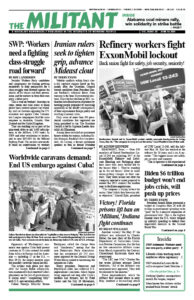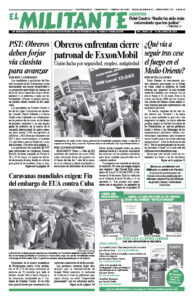Another victory! On May 27 the Militant was informed by Charles Huber, the new chair of the Florida Department of Corrections Literature Review Committee, that the ban on five consecutive Militant issues from March imposed by the Century Correctional Institution there was overturned.
“The LRC met 5/24,” Charles Huber wrote Militant attorney David Goldstein. “All of the Militants you mentioned were approved. They will be released to the inmates.”
These impoundments, which the Militant first learned about in early May, involved a far-reaching attack on the right of the paper to present its political point of view, targeting 11 articles prison authorities deemed “inadmissible.”
These articles covered important struggles by working people, from the union-organizing drive at Amazon in Alabama to the strike being waged by steelworkers against Allegheny Technologies Inc. They also objected to the paper’s reports on the readers contributing all or part of their government “stimulus” checks to the Militant and Socialist Workers Party.
Each article, the rejection notices from Century prison officials claimed, “encourages, riot, insurrection, rebellion, organized prison, disruption of the institution.”
“The victory in rolling back this ban is a victory for the rights of our readers behind bars and of the constitutional rights of freedom of speech and of the press,” said Militant editor John Studer. “We will fight against all impoundments. And most of the time, as here, we’re successful.”
‘Militant’ fights ban in Indiana
In Indiana, Kevin “Rashid” Johnson, incarcerated at the Wabash Valley Correctional Facility in Carlisle, has been denied two Militant issues that report on gains made by workers and farmers in Cuba through making and defending their socialist revolution in the early 1960s. Authorities said they didn’t like a photo run in both issues — it accompanied an article in English in one, and the same article in Spanish the following issue — because it showed “images of guns.”
At issue is a well-known historical photo of Cuban militia members celebrating after the defeat of the U.S.-organized attempted mercenary invasion at the Bay of Pigs in April 1961.
Johnson is a leader of the New Afrikan Black Panther Party. He informed the Militant that while prison officials claim they bar photos of guns, they show and rent television movies that depict guns and gun violence, for example “The Courier” and “Monster Hunter.” The Militant fought successfully to reverse impoundments of his paper last year and in 2019.
“I’m very surprised to hear that Johnson is not being given his paper,” said George Blue, a former prisoner who lives in Michigan City, Indiana, in a phone interview May 29. “I’m sending a letter to protest this.”
Blue was first introduced to the Militant while incarcerated at the federal prison in Leavenworth, Kansas, in the late 1950s, and has been reading the paper ever since.
After being transferred to a prison in Atlanta in the early ’70s, “I got a couple issues of the paper and no more,” Blue said. “Then one day a guy told me, ‘George, in the library there are Militants with your name on it.’”
Blue got in touch with the American Civil Liberties Union to challenge why he wasn’t getting the papers. Prison officials “didn’t know what to say so they gave them to me,” he said.
“I’ve learned a lot from the Militant,” Blue said. “Prisoners in the federal system all respected the Militant, which is what upsets the officials.”

